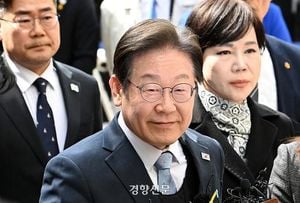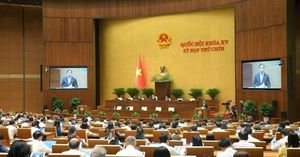China has recently amplified its warnings about the nuclear threat posed by the war between Russia and Ukraine. This follows growing speculation about the U.S. potentially stationing nuclear weapons within Ukraine's borders. During Thursday's regular press briefing, Chinese Foreign Ministry spokesperson Mao Ning emphasized the gravity of the situation, stating, "China is paying close attention to the nuclear risks triggered by the Ukraine crisis and has reiterated time and again, nuclear weapons should not be used and nuclear war must not be fought."
Mao's comments came as she responded to reports from The New York Times citing unnamed U.S. officials discussing the possibility of reintroducing nuclear arms to Ukraine. This hypothetical move aims to deter any future aggressions from Russia after negotiations to end the conflict. Historically, Ukraine possessed the world’s third-largest nuclear arsenal, including approximately 1,900 strategic warheads, but voluntarily gave them up in 1994. This relinquishment was made with the promise of security from three major nuclear powers: the U.S., the U.K., and Russia.
"Under the current circumstances, all parties need to remain calm and exercise restraint," Mao advised, stressing the importance of dialogue to cool tensions and mitigate strategic risks. The call for calm reflects not only China's position but also concerns about escalations, especially following the Biden administration's recent approval for Ukraine to utilize U.S.-supplied Army Tactical Missile Systems (ATACMS) to target within Russian territory.
Despite Beijing's insistence on neutrality, its actions have closely aligned with Russia. China’s economic and diplomatic partnership with Moscow has deepened since the onset of the war, resulting in markedly increased trade, particularly with Russian oil and gas. Critics have highlighted how Chinese authorities have supported Kremlin narratives and stifled dissent against the war on domestic platforms.
Inside China, there is significant censorship of any anti-war sentiment, and Beijing has skillfully positioned itself as both supportive of Russia and yet outwardly advocating for peace talks. Julie, who follows international relations, noted, "China is walking a tightrope where it must appear neutral to gain respect and stability, yet it continues fostering strong ties with Russia, which complicates its role as peacemaker."
Military cooperation between the two countries has also intensified, which China frames as part of its strategy to counter U.S. influence globally. Analysts suggest this dynamic places China at the crossroads of international diplomacy, significantly impacting any peace negotiations.
Jack Watling, senior research fellow at the Royal United Services Institute, shared his thoughts on the escalation of conflict. Although analysts widely agree about the potential risks of nuclear response from Russia, Watling argues these fears may be overblown. He remarked, "The question of escalation risk persistently lingers over this discussion. This has become stuck in a debate over whether any such weapon employment would lead to a nuclear response, which it certainly will not." Watling believes this perspective limits productive dialogue about tactical strategies and conflict resolution.
He characterized Russia's actions as inherently escalatory, mentioning deployments of thousands of North Korean troops to bolster the Russian front lines. Such developments raise new alarms about the nature of the conflict and complicate efforts to de-escalate. Concurrently, the White House faces significant pressure to maintain military and financial support for Ukraine amid fears of Republican dissent.
Former President Donald Trump has now emerged as a figure advocating for immediate negotiations aimed at ending the war. He has criticized President Biden's current strategy, which he describes as lacking decisiveness. Throughout his campaign, Trump has promised to stabilize and conclude the war quickly.
China's call for dialogue and restraint has met mixed receptions internationally. Western nations, particularly, are watching closely as the geopolitical dynamics shift. While Beijing's overtures may appear to signal potential easing tensions, the reality is far more complex. The stakes continue to rise as the situation remains uncertain, showcasing the delicate balance China must navigate as it positions itself amid global tensions.
The 33-month-long conflict has created ripples across the globe, with consequences reaching far beyond the immediate geography of Eastern Europe. With the potential for nuclear escalation hanging like a dark cloud over the parties involved, calls for temperance echo amid the growing military alliances forming between nations.
While the situation develops, the world watches, and uncertainties loom large. Who holds the key to peace remains unclear, but the absolute need for diplomatic engagement shines brighter than ever. China’s position, striving to sustain balance, continues amid waves of rising threat levels and international scrutiny. Amidst this anxiety, the hope for resolution must be firmly placed on thoughtful discussions rather than the deployment of untamed power.



